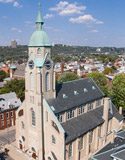“‘Among the Christian faithful by divine institution there exist in the Church sacred ministers, who are also called clerics in law, and other Christian faithful who are also called laity.’ In both groups there are those Christian faithful who, professing the evangelical counsels, are consecrated to God and so serve the Church’s saving mission. Catechism of the Catholic Church.” (CCC), par. 934
“Clerics” are the ordained ministers of the Church (bishops, priests and deacons). Religious brothers are not ordained, but have taken vows of poverty, chastity and obedience (the “evangelical counsels”). Similarly women, who take these same vows are called religious sisters or nuns. Religious brothers and sisters lead a life “consecrated” to God and His Church in a special way. They are called “Religious” because they belong to a Religious Order, like the Franciscans or Benedictines. Priests can either belong to a diocese or to a religious order.
.
Discerning a Vocation:
.
.
Please contact our diocesan vocation director: Fr. Michael Norton: (859) 392-1500
Understanding the Priesthood:
.
.
.
.
.
.
Holy Orders is the sacrament through which the mission entrusted by Christ to his apostles continues to be exercised in the Church until the end of time: thus it is the sacrament of apostolic ministry. It includes three degrees: episcopate, presbyterate, and diaconate. CCC, 1536.
.
About the Consecrated Life (of a religious brother or sister)
.
“The life consecrated to God is characterized by the public profession of the evangelical counsels of poverty, chastity, and obedience, in a stable state of life recognized by the Church.” CCC, 944 “Religious life was born in the East during the first centuries of Christianity. Lived within institutes canonically erected by the Church, it is distinguished from other forms of consecrated life by its liturgical character, public profession of the evangelical counsels, fraternal life led in common, and witness given to the union of Christ with the Church.” CCC, 925

